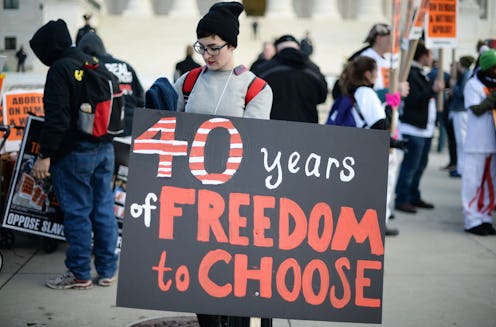Life
Hate Groups In The U.S. Are On The Rise
If you've been even vaguely following American politics over the last few years, it's probably no surprise that the number of hate groups in the United States rose in 2015 (although the lack of surprise certainly doesn't make the information any less depressing). According to the Southern Poverty Law Center (SPLC), a watchdog group known for their representation of victims of hate groups, there are almost 900 hate groups currently operating in America — a 14 percent increase since the previous year, and the first time this number has risen since 2011.
The center notes in its report that the current spike is part of a larger trend toward extremism since the turn of the century, one which sharply increased after Barack Obama was elected president in 2009. Although the amount of hate groups stagnated and eventually began to decline five years ago, 2015 represented a sharp uptick in extremist actions and ideology across the country. There are the obvious examples: The horrific shooting in a Planned Parenthood in Colorado Springs, Colo., and the murder of nine black churchgoers in Charleston, SC by a white supremacist. But as the report notes, such instances are "just the worst of numerous other attacks and foiled extremist plots" that occurred in 2015. Although, unlike the previous two examples, there's no physical violence in this third one, I would also argue that the frankly astonishing popularity of Donald Trump — whose campaign for the Republican presidential nomination has been built upon anti-immigrant, misogynistic rhetoric — is also a sign of a shift toward more extremist views
The SPLC points to a variety of factors for the rise in hate groups, including immigration, the legalization of same-sex marriage, police shootings, and backlash against American Muslims in response to jihadist attacks abroad. With so many racially-charged issues brought into the national spotlight, it makes disturbing sense that while most categories of hate groups declined, chapters of the infamous white supremacist organization the Ku Klux Klan more than doubled, and anti-Muslim hate groups grew by 42 percent since 2014. Black separatist groups saw a significant increase in number as well, which the report attributed to the popularity of the Black Lives Matter movement; unlike Black Lives Matter, however, separatist groups generally "demonized all whites, gays, and, in particular, Jews."
Finally, the report notes the impact of extreme political rhetoric in the wake of a "remarkable" year for domestic terrorism. "[Political figures] frequently exploited the anger and polarization across the country for political gain," editor Mark Potok wrote.
Although the SPLC's report focuses on racially-motivated hate groups, the effects of extremism are clear in the fight to protect reproductive rights as well: The SPLC points out a Tennessee political candidate whose platform argues that anyone who has received an abortion should be executed (yes, really), and it notes a "rash of anti-abortion violence" directed at women's health clinics after the release of videos claiming Planned Parenthood illegally sold body parts. The videos have since been discredited.
But despite the discrediting of the videos, the damage was already done. In addition to repeated (and ongoing) attempts to defund Planned Parenthood, 2015 saw the passage of some of the most restrictive laws on reproductive rights across the nation, and it didn't take long for women to experience the effects of such legislation. In Texas, for instance, reports indicate that defunding Planned Parenthood in many counties has led to increased rates of childbirth and decreased access to birth control for low-income women in the state.
Although it's natural to take dire predictions about America's moral decline with a grain of salt, the SPLC's report makes it clear that political polarization is increasingly widespread — and when politicians fail to work together, it's the whole country that loses.
